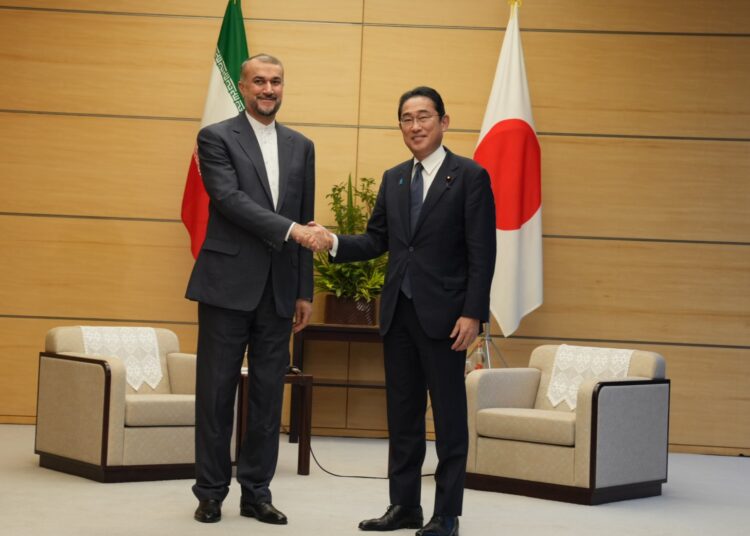Japanese Prime minister says Japan supports the revival of negotiations between Iran and the other parties for the full implementation of the JCPOA obligations and is ready to contribute to the process.
Iran’s Foreign Minister, Hossein Amirabdollahian, arrived in Tokyo, the capital of Japan, and held talks with the Japanese Prime Minister and Foreign Minister on Monday. During a meeting with Japanese Prime Minister Fumio Kishida, Iran’s Foreign Minister emphasized Iran’s role in improving energy security in the Persian Gulf and expressed Iran’s stance regarding the necessity of a political solution to the Ukraine crisis.
The Prime Minister of Japan expressed his satisfaction with the new positive developments in the Persian Gulf region and stated that Tokyo supports regional cooperation in order to promote sustainable security. On the talks between Iran and the West, Kishida said, “Japan supports the revival of negotiations between Iran and the other parties for the full implementation of the JCPOA obligations and is ready to contribute to it.”
Upon his arrival and before meeting with the Prime Minister and his Japanese counterpart, Amirabdollahian appeared before the Japanese media at the residence of the Iranian ambassador in Tokyo and answered their questions. Japanese journalists mainly asked questions about issues related to Ukraine, the JCPOA, negotiations between Iran and the United States about prisoner exchange, cooperation between Iran and Russia, and security in the Persian Gulf.
The issue of Ukraine is of great importance for the Japanese side, especially in the public domain. For this reason, the Japanese media outlet TBS reported that one of the important issues during this trip would be pressure on Iran not to send weapons to Russia in the Ukraine war. A significant portion of the questions asked by Japanese journalists this morning were related to this issue. In response, Amirabdollahian stated during a press conference, “Today, I read a report in Japan confirming that the weapons used in Ukraine were mostly supplied by the United States and Western countries. We have not provided any drones to be used in the war in Ukraine.”
Referring to a meeting between military experts from Iran and Ukraine, Iranian FM said, “No acceptable evidence was presented by Ukraine in this meeting regarding their claims. It was agreed that the Ukrainian side would check its evidence again and they would be examined in another meeting with the Iranian side. We repeatedly followed up on holding this meeting, but the Ukrainian side did not show up for a new round of talks.”
In response to a question about negotiations with the United States, Iran’s foreign minister pointed to indirect talks about prisoner exchange and stated, “We have had indirect talks with the American side in this regard since last year.”
Since a significant portion of the world’s energy needs are exported and transited through the Persian Gulf, this issue is also one of Tokyo’s concerns. The increase of American military forces I nthe region and Iran’s reactions to it have been one of the important topics covered by global media. In previous meetings with foreign officials, especially those from within the region, Iran’s foreign minister emphasized that regional countries can provide security independently without extra-regional interference. He also stated during today’s meeting, “We expect that collective security within the region will be well provided through the strength and capacity of regional countries and that we expect Japan to support this policy.”
Previously, Iran Nuances had reported citing an Iranian source that “bilateral cooperation, consultation on international developments, and lifting sanctions” would be among topics discussed during talks in Tokyo.
Although examining the bilateral relations between Tehran and Tokyo is one of the items on the agenda for this trip, Japan’s close relationship with the United States has caused the international aspects of the trip, particularly the issue of lifting sanctions, to cast a shadow over other issues in Iranian media.
It appears that the weight of these issues is not equal or similar from the perspective of both sides. While the Japanese side views these talks through the lens of the Ukraine crisis and security in the Persian Gulf region, the Iranian side prioritizes finding economic opportunities, releasing Iranian financial resources, and lifting sanctions. This difference in opinion may be due to Japan’s need to highlight pressure on Iran in the context of Ukraine in order to satisfy its western partners.
Part of Tehran’s money is yet in Japan following oil imports from Iran. Nasser Kanaani, spokesperson for Iran’s Foreign Ministry, stated during a press conference in Tehran, “We will continue to pursue Iran’s financial demands from various countries, and with regards to Japan, this issue has been raised at various levels. Last year, during a meeting between the Iranian President and Japanese Prime Minister on the sidelines of the UN General Assembly in New York, this issue was discussed. The Japanese government has repeatedly announced its readiness to repay Iran’s debt and is making efforts to make this happen.”
One dimension of the Iranian Foreign Minister’s current trip that reflects the great importance of the visit is his meeting with the Prime Minister. Experience has shown that by devoting meetings at this level, the Japanese are seeking a clear and important agenda.
Detailed information regarding current Japanese Prime Minister Fumio Kishida’s view of Iran and how it differs from that of former Prime Minister Shinzo Abe, who visited Iran in 2019 after 41 years, is not available. However, due to its close relationship and coordination with Washington, Tokyo has occasionally attempted to mediate between Iran and the United States on issues such as nuclear negotiations or now on Ukraine. Interestingly, Japan’s current Prime Minister was previously chair of the Iran-Japan Parliamentary Friendship Association and has traveled to the region, including Iran, as foreign minister.






